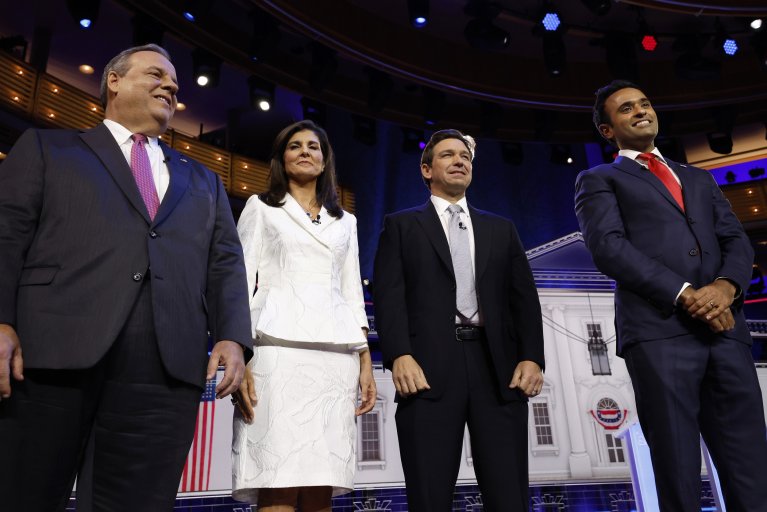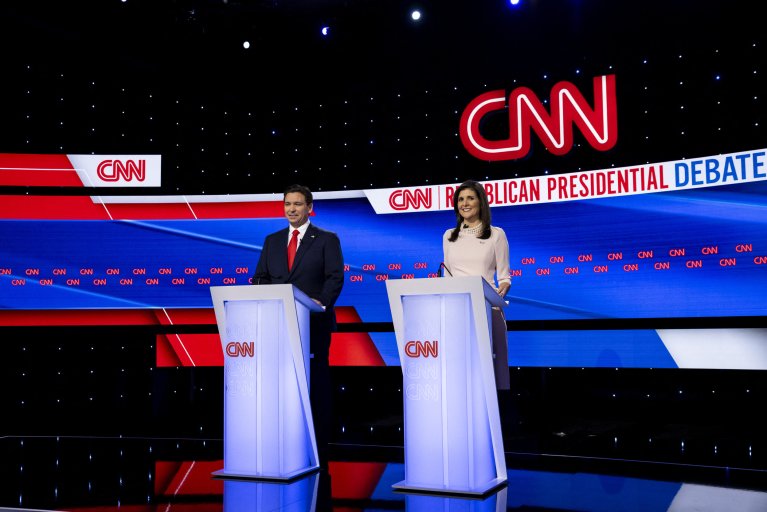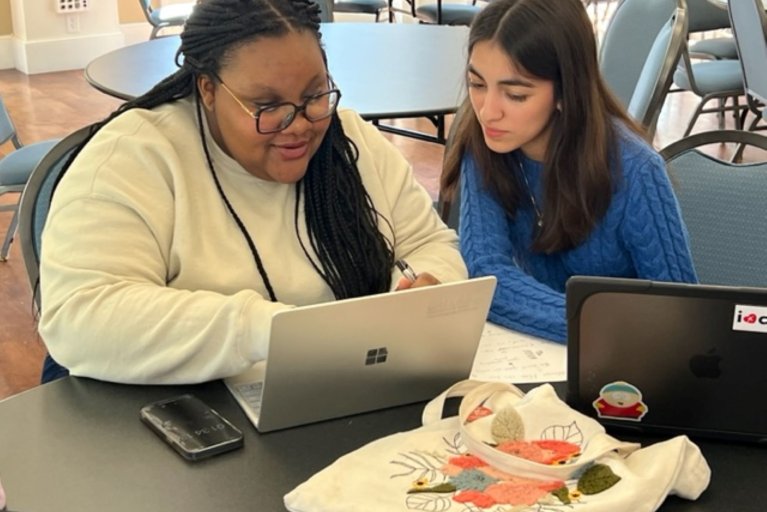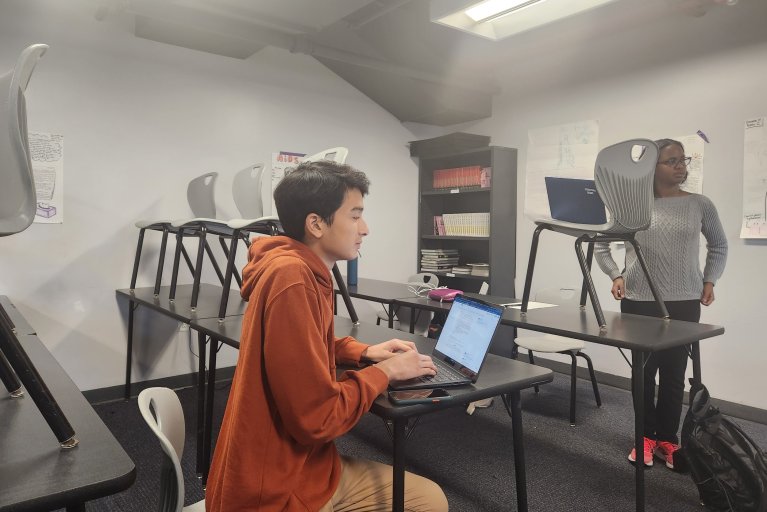Jan 11, 2024 At 12:47 AM EDT
- Tonight, two of the top GOP presidential candidates took the stage in Des Moines, Iowa, for the fifth Republican primary debate of the 2024 election cycle.
- Former South Carolina Governor Nikki Haley and current Florida Governor Ron DeSantis debated at Drake University. In order to qualify for this debate, candidates needed to draw at least 10 percent in three separate reputable national or Iowa polls of Republican caucus participants or primary voters that "meet CNN's standards for reporting," according to CNN, which is hosting this debate.
- The Republican front-runner, former President Donald Trump, maintains a significant lead over the other candidates. While he qualified for the debate, Trump was present. He instead participated in a Fox News town hall in Iowa. He has yet to attend a GOP primary debate this election cycle.
- This debate comes just five days ahead of the Iowa caucuses, the first official test for the GOP candidates among primary voters.
- In this article, two varsity high school debaters for the Washington Urban Debate League (WUDL) provide their analysis of each candidate's performance and gave the participants a letter grade to show the effectiveness of the candidates' debate and argumentation skills.
- The student debaters did not focus on the politics of the candidates' positions but rather their persuasion. The grades, modeled after a World Schools debate rubric, are determined by the candidates' style, content and strategy. The students analyzed the effectiveness of each candidate's argument by commenting on how well each candidate answered questions, presented their plans, interacted with other candidate and appealed to the audience.
Ron DeSantis

Candidate Background Ahead of the Debate: The past four GOP debates have done nothing to change former President Donald Trump's current lead in the polls. Ron DeSantis and Nikki Haley are far behind Trump in national and Iowa polls, and they're both hoping to gain some sort of edge in the race.
On Tuesday, DeSantis gave Florida's State of the State address. He reiterated many of the sentiments he's mentioned in past debates, like the claim that Florida is thriving because of his political successes and policy achievements. He also drew contrasts between his leadership in Florida and leadership in places governed by Democratic politicians. This picture of the Democratic Party is likely something that many Republican voters agree with, but criticizing Democrats isn't an approach that distinguishes DeSantis from Trump or Haley.
Tonight, I expect him to draw a dark picture of present-day America and follow up with examples of what he claims are successful policies in Florida. With the quickly approaching Iowa caucuses, DeSantis seems to be counting on his strategy of making many appearances around Iowa by visiting various restaurants and going to town halls. He is certainly not a new face to the Iowans in the debate audience, and I do not expect him to make drastic changes to his main talking points.
Candidate Debate Analysis: DeSantis started the debate by making an appeal to families across America. In his initial remarks, he stated that he is for the issues of "you" and "your families," addressing the audience. This move is intended to create a personal connection, which DeSantis later tried to build upon by giving examples of policies that he has enacted in Florida. He also tried to evoke an emotional response by painting a gloomy picture of America: At one point, DeSantis said, "The American Dream is slipping away."
With all this being said, in his opening comments, DeSantis appeared a bit uncomfortable. It could have been an issue with his microphone, but in certain instances, his voice seemed to reverberate in a nervous tone. For comments that should have been practiced to perfection, it seemed like it took a couple of minutes for him to get comfortable on the stage.
Donald Trump is running to pursue his issues.
— Ron DeSantis (@RonDeSantis) January 11, 2024
Nikki Haley is running to pursue her donors’ issues.
I’m running to pursue your issues, your family’s issues, and to turn this country around. pic.twitter.com/srace9EkPL
DeSantis also tried to establish a troubling link between Haley and her donors. He claimed that Haley only serves the people funding her campaign and that she is "corporate." If this claim went over well with the audience, then Haley's credibility would be damaged. However, when Haley responded to these claims of corporatism, she received audience reactions of laughter and applause, showing that DeSantis' attacks might not have been effective enough to give him an edge. Later in the debate, DeSantis made fewer digs at Haley's donors and focused more on her leadership in South Carolina.
One good rule of thumb: If Nikki Haley says she’s never said something, that definitely means she said it.
— Ron DeSantis (@RonDeSantis) January 11, 2024
Then she’ll say ‘you’re lying you’re lying,’ that means not only did she say it — but she’s on video tape saying it. pic.twitter.com/x1K5ay1hFC
Throughout the debate, DeSantis looked most comfortable when discussing his achievements in Florida. He mentioned winning disputes with a teachers' union, banning China from buying land in Florida and reducing Florida's debt. It is generally an effective move to call upon your past experiences to support what you will do in the future. However, there are instances when DeSantis pivoted away from the question at hand to instead tout one of Florida's policies. When asked about foreign affairs, DeSantis pivoted toward talking about Florida's economy; CNN moderator Jake Tapper responded by bringing him back to global issues. DeSantis is clearly proud of his state, but when he made these leaps, it seemed like he was ill-prepared to discuss foreign matters, while Haley characterized herself as an expert in these topics.
As the night progressed, DeSantis seemed to be getting better crowd reactions, many of which were louder than the reactions to Haley's comments. One reason he seemed to win over the audience could have been that he mentioned having the endorsement of Iowa Governor Kim Reynolds. That moment received much applause, and it makes sense that DeSantis would try to appeal to Iowans who support Reynolds. The crowd might have also been getting tired of the back-and-forth between DeSantis and Haley, with both of them accusing the other of lying.
You can take the ambassador out of the United Nations, but you can’t take the United Nations out of the ambassador. pic.twitter.com/n3wBmAfMan
— Ron DeSantis (@RonDeSantis) January 11, 2024
DeSantis' performance could have been improved by some more specificity when answering questions on topics like foreign policy and climate change. It was noticeable when he was uncomfortable with a topic because he would change the subject to Florida or begin talking about Democratic leaders.
When he was most effective, DeSantis numbered his list of action items. In a couple of instances, his closing point received a loud applause from the audience at Drake University. This marked a change from the previous debates. Whether his performance today will noticeably close the gap with Trump is left to be seen in the looming Iowa caucuses.
Candidate Debate Grade: B
— Akesh, Washington Urban Debate League

Nikki Haley
Candidate Background Ahead of the Debate: As the GOP spotlight narrows on Nikki Haley and Ron DeSantis in Iowa tonight, Haley has a clear objective: to soon be the only second-place candidate to former President Donald Trump—the current Republican front-runner. Haley built momentum during the fall, but she still has to distinguish herself from DeSantis and explain to Iowans why she is the best alternative to Trump. So far, Haley has positioned herself as a focused and rational Republican who will reduce the deficit and bring normalcy back to the U.S.

Candidate Debate Analysis: Haley went on the offensive with DeSantis, saying at one point, "He is mad because his donors are leaving him...his campaign is exploding." She also tried to dim her opponent's support by regularly directing viewers to DeSantisLies.com.
She also asserted her experience in comparison to DeSantis to say she would be the more effective president.
"We need someone with executive experience," she said.
Haley clearly wanted to separate herself from DeSantis by presenting herself as an honest and capable candidate. She said she could be "the accountant of the White House" and mentioned her time running South Carolina, saying, "I balanced accounts when I was governor." She said that she will remove the gas tax, simplify tax codes and cut taxes on the middle class—this was a way to be more specific about campaign promises.
Leadership is about delivering results for those who've put their trust in you. In South Carolina and at the UN, that's what I've done. pic.twitter.com/E9T7ylDb2U
— Nikki Haley (@NikkiHaley) January 11, 2024
Haley's later remarks focused on her experience and achievements as governor of South Carolina and a U.N. ambassador. Whether she was asked a question about education, gender or China, Haley referenced her past experience—a consistent strategy to characterize herself as a capable and wise executive. She also continued her critiques of DeSantis: "If you can't manage a campaign, how can you manage a country?" This statement was clearly meant to stir doubts in the viewers' eyes about DeSantis.
DeSantis looks pretty uncomfortable here pic.twitter.com/W8sRKpQzV6
— Acyn (@Acyn) January 11, 2024
In the later half of the debate, Haley criticized the events of January 6, 2021, and also Trump for trying to overturn states' rights and the 2020 presidential election. This was notable because she has recently been slow to criticize Trump and the controversies surrounding him. It's likely that she addressed the Trump issues to appeal to independents and moderate Republicans, who might want someone with a more centrist persona.
Haley: That election, Trump lost it. Biden won that election. I think what happened on January 6th was a terrible day and I think President Trump will have to answer for it pic.twitter.com/ucu5E7ycpX
— Acyn (@Acyn) January 11, 2024
Overall, Haley's main focus in this debate was to make the case that she is the best GOP candidate on the debate stage. She consistently brought up her past experience and accomplishments, to stress to viewers that she is a proven leader. Haley also contrasted herself with DeSantis by repeatedly bringing up DeSantisLies.com—enough times that it clearly started to fall flat with the audience as the night went on. Ultimately, Haley distinguished herself from DeSantis as a seasoned and centrist Republican candidate who hopes to win increased support from independents and moderate Republicans who don't want to vote for Trump.
Ron is going to lie about my record all night. So we came prepared. Check out https://t.co/vsSdcWrMfj
— Nikki Haley (@NikkiHaley) January 11, 2024
Candidate Debate Grade: A-
— Leah, Washington Urban Debate League








